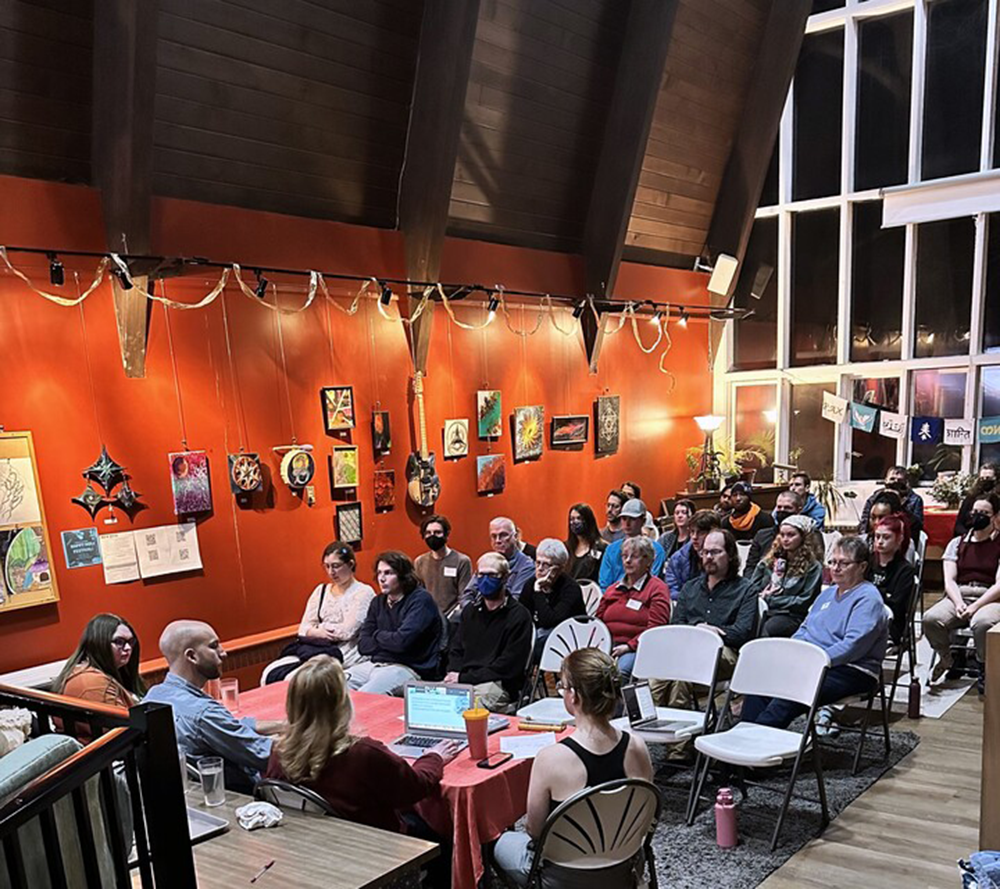On Thursday, March 6, the Wilson Center at the University of Maine held another weekly “Dinner and Dialogue” session for an incredibly relevant cause: houselessness in the nearby community and beyond.
Dozens of faculty, students and community members joined together over vegetarian Cuban sandwiches handmade by Wilson Center volunteers, and then listened to an in-depth panel on helping those without houses.
The National Health Care for the Homeless Council, which presented at the event, explained the difference between a person who is unhoused and one who is precariously housed.
A person who is unhoused does not have a secure or sufficient place to stay overnight, while a precariously housed person is at risk of becoming homeless within 3 months in the case of income loss. Precariously housed individuals also include those who require other incomes for housing or who stay with friends.
McK Mollner, a UMaine graduate student and event panelist, delivered opening remarks. They first got involved in housing insecurity work via involvement in housing initiatives in their home state of Virginia, specifically focused on helping LGBTQ+ young adults without homes.
“Queer youth are at almost double the risk for houselessness as other young adults,” Mollner explained. “[For] trans young adults ages 18 to 25, almost 1 in 4 will experience homelessness in their lives… That was something near and dear to my heart as a trans person.”
The passion exuded by the attendees was further underlined by the dire reality of the subject.
“While it’s hard to say at every college campus, somewhere around 7% of college students experience homelessness or housing precarity during their college careers,” Mollner added. “Because of this, I wanted to put together this panel…to raise awareness and bring attention to what services there are and what services there aren’t, so we as a community can learn to better support each other.”
The Wilson Center panel consisted of Mollner and three other individuals: Jamie Beck, executive director of Bangor houseless support nonprofit Dignity First, Rob Laraway, member of the Orono Town Council and Brenna Jones, mathematics and sociology student at UMaine whose research focuses on helping unhoused individuals.
Beck presented information on Dignity First, a 501(c)(3) Housing First nonprofit organization based in Bangor, Maine. Dignity First focuses on respecting unhoused people and focusing on getting them into stable living spaces without a focus on sobriety, but instead concentrating on support and community.
Community First, which Beck describes as a tangential organization, takes these pillars and focuses them into a vision of a community-based village for unhoused people that provides living spaces and support as well as intentional neighbors who live in the village to support formerly unhoused people. There is one model of this in Austin, Texas where fresh food is grown in village farms and used to feed people. While it will be a little while before this is seen in the greater Bangor area, Beck excitedly shared that Dignity First is working on their first tiny house for an eventual village.
Laraway shared his experience both as an involved Orono town council member and as a formerly houseless UMaine student, sleeping in music buildings and eating from a broken vending machine until he started staying with different friends. He recalled a professor instructing him to drop her class when he couldn’t afford to buy a textbook, which was ironic given the class’s focus on individuals who were held back in education by disabilities.
As a council member and community organizer with Maine People’s Alliance, Laraway now focuses on helping people in unhoused situations like he once experienced. This can look as simple as public transportation.
“One of the reasons I was dealing with precarious and unhoused situations when I was in school is that I did have a spot I could’ve slept in in Bangor, but the buses didn’t run. I had classes. I had to choose between having a place to sleep and maintaining my status as a student trying to further my education,” Laraway said.
Laraway explained that while resources are much less than satisfactory, applying for general assistance can help with living costs, as can Maine Health and Human Services.
Jones is the coordinator of UMaine’s Peace and Justice Center and has three leadership roles with the Greater Bangor Houseless Collective. She shared her houselessness experience living out of her car in high school and not even knowing that qualified as unhoused.
“Being unhoused is often an invisible identity to a lot of people, even if you don’t think that it would be. It doesn’t always look like someone living on the side of the street, it doesn’t always look like someone living in a tent by the river, it looks like a lot of forms,” Jones said.
She devotes Sundays to sharing food with unhoused people in Bangor, as well as creating a sense of community and conversation.
“The main thing I’ve taken away from [working with Greater Bangor Houseless Collective] is that these are just people,” Jones stated.
Assistant professor of sociology Dr. Brian Pitman works with Jones on houselessness research and shares many ways to get involved on a faculty level.
“There are definitely plenty of opportunities to connect with organizations that those of us are doing at the university. Trying to divert funding from the university directly to these directly impacted communities is one way, whether it is through internal grants that provide food to those experiencing housing and food insecurity or a faculty/staff mutual aid group, as I can only imagine that, like grad students, our faculty and staff are having their own issues with housing precarity and food insecurity,” Pitman stated.
“In general, our faculty and administration should work to financially, emotionally and socially support student workers… students in general, and each other, as housing, food, heating and almost all other costs continue to sky-rocket and more people continue to suffer from these debilitating conditions,” Pitman said.








